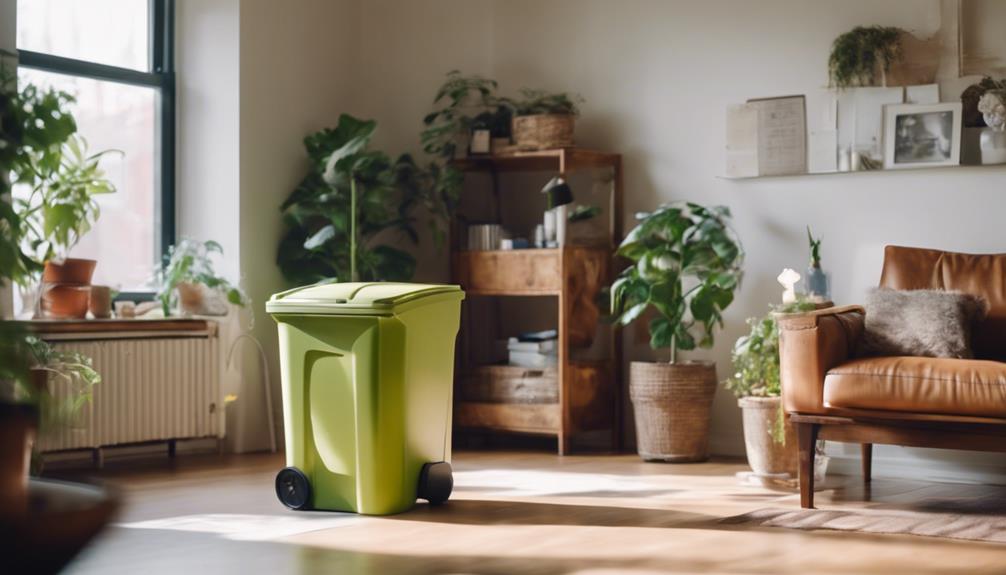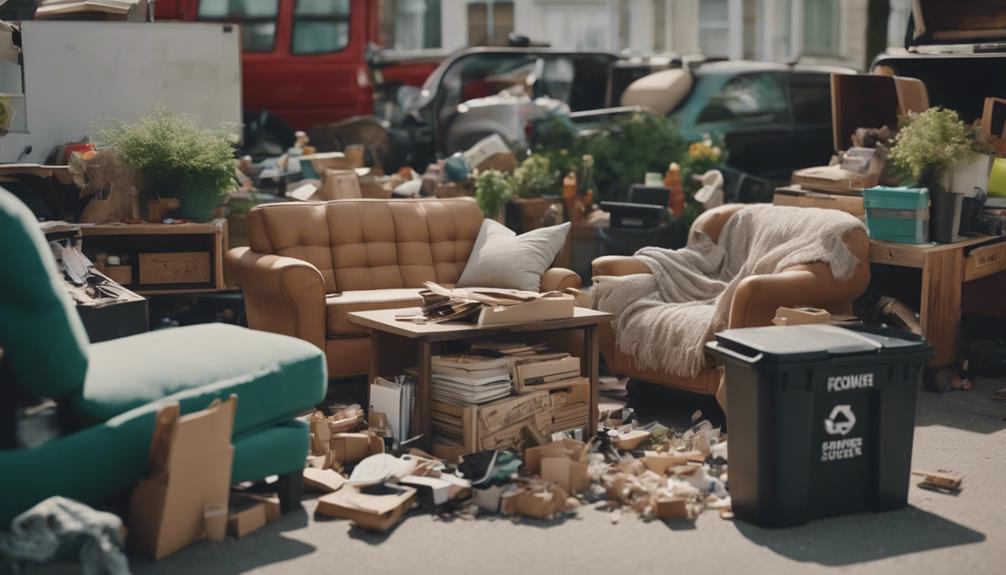When you have unwanted furniture, there are smart strategies to dispose of it effectively. You can sell items online using platforms like Facebook Marketplace or Craigslist, where clear photos and competitive pricing attract buyers. Alternatively, consider giving it to friends or family in need, or donating to organizations like the Salvation Army, which often provide pickup services. For furniture in poor condition, check local recycling centers or wait for curbside pickup. Finally, think ahead about your furniture choices to avoid future hassle. Keep going to explore even more ideas that can simplify this process!
Key Takeaways
- Sell unwanted furniture quickly on platforms like Facebook Marketplace or Craigslist, ensuring to provide clear photos and detailed descriptions.
- Donate good-quality items to charities like Salvation Army or Goodwill, which often offer pickup services for larger items.
- Offer furniture to friends or family in need, leveraging social media and community events for broader outreach.
- Consider eco-friendly disposal methods, such as recycling centers or curbside pickups, for damaged or poor condition furniture.
Sell It Online

You can often sell unwanted furniture online quickly by utilizing platforms like Facebook Marketplace and Craigslist.
Start by taking clear, well-lit photos of your items from multiple angles. Write detailed descriptions, highlighting the furniture's features and dimensions, and be upfront about any wear and tear to maintain buyer trust.
Research similar listings to set a fair price that attracts potential buyers. If your furniture is high-end, consider consignment shops, as they can help you reach a targeted audience.
Engage with interested buyers promptly and be flexible with meeting times to facilitate a quick sale.
Give Furniture to Someone in Need
Instead of selling, consider offering your unwanted furniture to friends, family, or neighbors who might need it.
You'd be surprised how many people are grateful for good-quality items they mightn't have the budget to buy.
Share photos and descriptions of your furniture on social media to reach a broader audience.
Don't underestimate the power of word-of-mouth; mention your available items at community events or gatherings.
You might find unexpected interest from acquaintances or extended networks.
By rehoming your furniture, not only do you help someone in need, but you also reduce landfill waste, making a positive impact on your community.
It's a win-win situation for everyone involved!
Donate to Charitable Organizations

Donating unwanted furniture to charitable organizations not only provides support to those in need but also promotes sustainability within the community.
Organizations like the Salvation Army and Goodwill often accept your donations, and many even offer pickup services for larger items, making the process easier for you.
Before donating, it's important to research their guidelines to guarantee your furniture meets their criteria—items should be in good condition, structurally sound, and often pre-assembled.
By donating, you're helping individuals and families access necessary resources while reducing waste.
It's a win-win: you declutter your space and contribute positively to your community.
Gently Dispose of Poor Condition Furniture
Gently disposing of furniture in poor condition is essential for responsible waste management and can be accomplished through various eco-friendly methods.
First, check for curbside pickup days in your neighborhood; many municipalities offer scheduled collections for large items. If that's not an option, look for local recycling centers that accept damaged furniture—Earth911's search tool can help you find nearby facilities.
Consider upcycling raw materials by repurposing parts for DIY projects or donating them to businesses that specialize in such efforts. By choosing recycling over disposal, you help reduce landfill contributions and promote a more sustainable approach to waste.
Make Smart Choices About Future Furniture

When choosing future furniture, consider how long you'll be in your new home to make informed decisions about your investments. If you plan to stay long-term, investing in quality pieces is worth it. For short-term leases, renting might be your best bet. Avoid fast furniture, as it contributes to landfill waste. Instead, look for affordable, high-quality used options.
| Duration of Stay | Furniture Type | Recommended Action |
|---|---|---|
| Long-term (3+ years) | Quality furniture | Invest in durable pieces |
| Medium-term (1-3 years) | Semi-durable furniture | Buy second-hand or sale items |
| Short-term (less than 1 year) | Rental furniture | Rent for flexibility |
Smart choices now mean less hassle later!
How Can Unwanted Furniture Disposal Strategies Benefit from Revolutionized Student Furniture Rental Solutions?
When it comes to unwanted furniture disposal, student furniture rental solutions revolutionized can offer a sustainable and eco-friendly alternative. By providing students with affordable rental options, it reduces the need to purchase disposable furniture, ultimately minimizing waste and benefiting the environment.
How Can I Dispose of Unwanted Furniture and Upcycle it into Smart Furnishings for my Workspace?
If you’re looking to transform workspace smart furnishings, consider upcycling your unwanted furniture. Old tables or chairs can be refurbished with a fresh coat of paint and repurposed into stylish and functional pieces for your office. With a little creativity, you can give new life to your old furniture while saving money.
How can I dispose of unwanted furniture in a sustainable and environmentally friendly way?
When looking for sustainable furniture disposal strategies, consider donating to local charities or thrift stores. Additionally, look for furniture recycling centers that can repurpose or recycle unwanted items. Upcycling or refurbishing old furniture is another eco-friendly option. Avoid sending furniture to landfills whenever possible.
Conclusion
As you tackle unwanted furniture, remember that about 9 million tons of furniture end up in landfills each year.
By choosing to sell, donate, or recycle your items, you're not just clearing space; you're making a positive impact on the environment and your community.
Every piece you pass on can help someone in need or reduce waste.
So, take action today—your decisions can create a ripple effect of kindness and sustainability that lasts well beyond your home!









